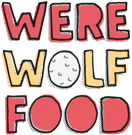Q&A: Answers to Your Most Common Dog Food Questions
At Werewolf Food, we often receive a variety of questions from dog owners. Whether you're a first-time pet parent or a seasoned dog lover, it’s natural to want the best for your furry friend. Here’s a roundup of some frequently asked questions, complete with tips and advice to ensure your dog thrives.
1. What age should I switch my puppy to an adult recipe?
Puppies grow at different rates depending on their breed and size. As a general rule:
- Small breeds (like Jack Russell Terriers): Switch around 10 months.
- Medium breeds: Typically transition around 1 year.
- Large and giant breeds (like Bernese Mountain Dogs): Wait until 18 months.
Ensure your pup has completed most of their growing before making the switch to ensure they get the nutrients needed for this critical stage.
2. My dog is sensitive to chicken. What do you recommend?
Some dogs may have sensitivities to chicken, even in grain-free recipes, possibly due to the chicken or duck being grain-fed. Alternatives to consider:
- Fish-based recipes for a gentler protein option.
- Grass-fed lamb or venison & salmon for premium, nutritious choices.
3. Help! My dog is a picky eater. Any tips?
Dogs can be picky, but these tips often help:
- Portion control: Werewolf Food recipes are nutrient-dense, so you don’t need to feed large quantities.
- Meal timing: It’s okay to split the daily amount into two meals, but if your dog is very picky, try one meal a day at teatime when they’re hungrier.
- Remove uneaten food: Place food down for a set time, then take it away until the next meal.
- No grazing: Avoid letting your dog eat on and off throughout the day.
- Avoid human food: Skip leftovers and treats outside their regular diet.
- Enhance aroma: Warm kibble briefly in the microwave to release its natural gravy for a more enticing smell.
- Encourage exercise: Activity can stimulate appetite.
4. I’m new to Werewolf Food. How do I know what recipe my dog will like?
We offer a free taster menu (just cover postage) with a selection of recipes and treats. This lets your dog try different flavours before committing to a full bag.
5. What are MOS and FOS? Does Werewolf Food contain prebiotics?
Yes, our food includes prebiotics such as MOS (mannan-oligosaccharides) and FOS (fructo-oligosaccharides). These ingredients promote healthy gut bacteria and aid digestion, contributing to your dog’s overall wellbeing.
6. Why does my puppy need a puppy-specific recipe?
Puppy recipes are designed to meet the demands of rapid growth:
- High protein content to support muscle development.
- Essential omegas for brain and joint health.
- Glucosamine and chondroitin for joint support and cognitive development during this crucial stage.
7. Is Werewolf Food expensive?
Werewolf Food offers premium quality at a reasonable price. To better understand its affordability, check out real-life feeding costs from our own dogs:
- Tilly (Senior, 10 years, active): Requires the senior/light recipe to maintain a healthy weight and support flexible joints. A 15kg bag costs £59.99, lasts 60 days, and works out to just £1 per day.
- Gordon (4-year-old terrier, small): Loves the small bite duck recipe. A 6kg bag costs £39.99, lasting 50 days at 80p per day.
- Tara (German Pointer, 3 years, active): Enjoys the larger chunky kibble salmon and potato recipe. A 15kg bag costs £52.99, lasting 33 days at £1.60 per day.
We try to be as transparent as possible about the value you get for your money!
8. The bag says 'working & sporting dog,' but my dog isn’t a working dog. Is it still suitable?
Absolutely. This label is a regulatory requirement for our 15kg bags, but the recipes are suitable for all breeds and activity levels.
9. How much should I feed my dog?
Check the feeding guide:
- On the bag or product pages on our website.
- Weigh your dog and start with the middle of the recommended range.
- Use a container to measure and mark the correct portion size.
- Remember, the guide is just that—a guide! Adjust based on your dog’s age, activity level, sex, breed, whether they’re neutered, and even the season. For example, some dogs eat less in warmer weather whereas some eat more because they are enjoying longer walks & hungrier.
10. Why feed kibble?
Kibble offers numerous benefits, including:
- Nutrient-dense, complete meals.
- Easy storage and serving.
- Promotes dental health by reducing plaque buildup.
For more details, click here.

